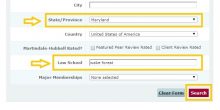
Martindale – A Great Alumni Search Tool
Posted: January 31st, 2014
As many law students already know, contacting alumni is a great means to further your career, especially when it comes to networking; however, it is still a piece to the larger job search puzzle as a whole. A student should still feel obligated to make a genuine connection before leveraging an alumni connection for any possible job opportunities or informational interviews. Don’t assume that simply knowing or contacting Wake Forest Law School alumni at a business or firm will give you a definite advantage. It is important to keep in mind that a job search is still a delicate process and alumni contacts are not built overnight.
There is no harm in reaching out to somebody to say hello or even ask to grab a cup of coffee together if you are in town. But if you want to approach an alumnus, you’re better off seeking advice as opposed to assuming the ‘we’re from the same school; hire me’ will work in gaining you a position within their firm/organization. Instead, try a simple introduction where you disclose that you are considering a specific summer experience and just ask if he or she has any advice about the industry or location in general. You could also request an informational interview or even a job shadowing opportunity if they have the free time. A great way to put this plan into action (instead of the often harsh, basic cold call) would be to meet an alum through a mutual contact, career advisor, alumni office, or via a regular alumni association networking event and start up a relationship from there.
Ok so now you have a strategy of how to communicate. So where are all the Wake Forest Law alums? One helpful tool that includes a majority of Wake Forest Law alumni is the Martindale database. You can access this database easily online through their website www.martindale.com. Once you are at the web site, click on the Advanced Search link under the People tab at the very top of the web page in the red section. From the ‘Advanced Search for Lawyers, Law Firms & Organizations’ page, you can fill out any necessary search criteria to narrow your alumni search.
Want to practice law or obtain a summer position in the Baltimore, Maryland metro area? Simply select Maryland from the State/Province drop-down menu and type “Wake Forest” in the Law School text box. Now click the Search button. (pictured above) Viola! You now have 59 Wake Forest Law alumni to choose from. Narrow your search even more by selecting your desired practice area or city on the left hand side of the screen under ‘Narrow results by’. Also, if you would like to identify Wake Forest Alums that are working in government agencies, conduct a search as outlined above and if there is a Government Agency category on the left on the results page, you will be able to narrow those results by selecting a particular Government Agency in which you are interested.
Many of the contact details in the search results will also feature phone numbers as well as a link to the contact’s company web site. Click the ‘View Website’ link to research their organization or firm in greater detail as well as give you a feel for the type of work they do. And nine times out of ten, the person in which you are trying to contact will also have a biography on the company web page, filling you in on their work history and achievements all the way back to Wake Forest.
If sending emails is your preferred means of driving your networking efforts, you can most often find email addresses for each alumni contact on their firm or company’s web site under a company directory or attorney drop down menu list. A downloadable vCard may also be available so that you can keep all their contact information, including their email address, on hand for future reference. Here is a sample email to use as a guideline when emailing alumni:
Dear Mr./Ms. ____________,
I found your name and contact information on Martindale’s online directory when searching for Wake Forest Alumni in the Baltimore, MD area. I am a first year law student at Wake Forest University School of Law, and I am interested in immigration law. I would greatly appreciate any advice or information you could offer me about the field. Would it be possible to set up a time to speak with you sometime next week via telephone?
Ready, set, go? If you want to iron out a plan about contacting Wake Forest Law alumni, be sure to make an appointment with your career advisor and give them an idea of your targeted geographic location and practice area. This will give your advisor the information they need to help you obtain important tips and advice on connecting and communicating prior to making your initial contact with Wake Forest Law alumni. With the right approach, you will gain experience in networking which will give you important, lifelong connections that will aid your career well into the future.




